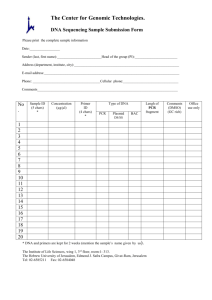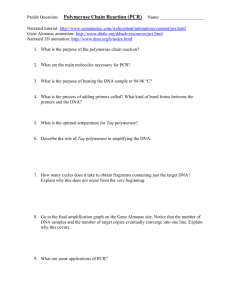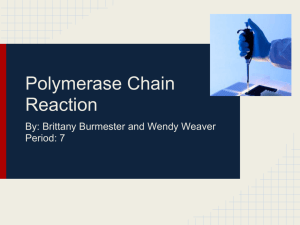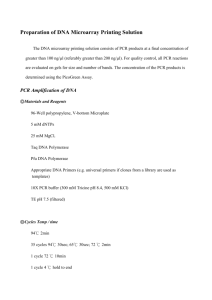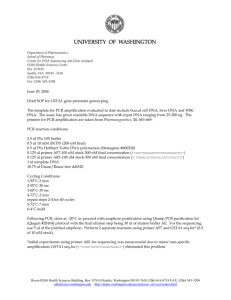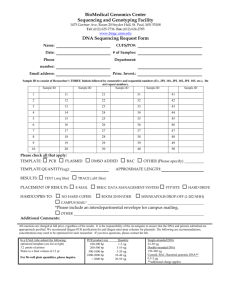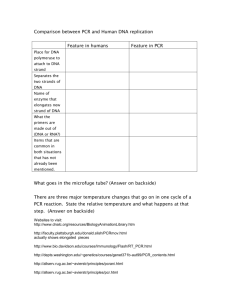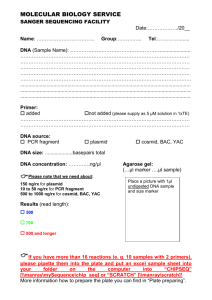PCR Polishing Kit - Agilent Technologies
advertisement
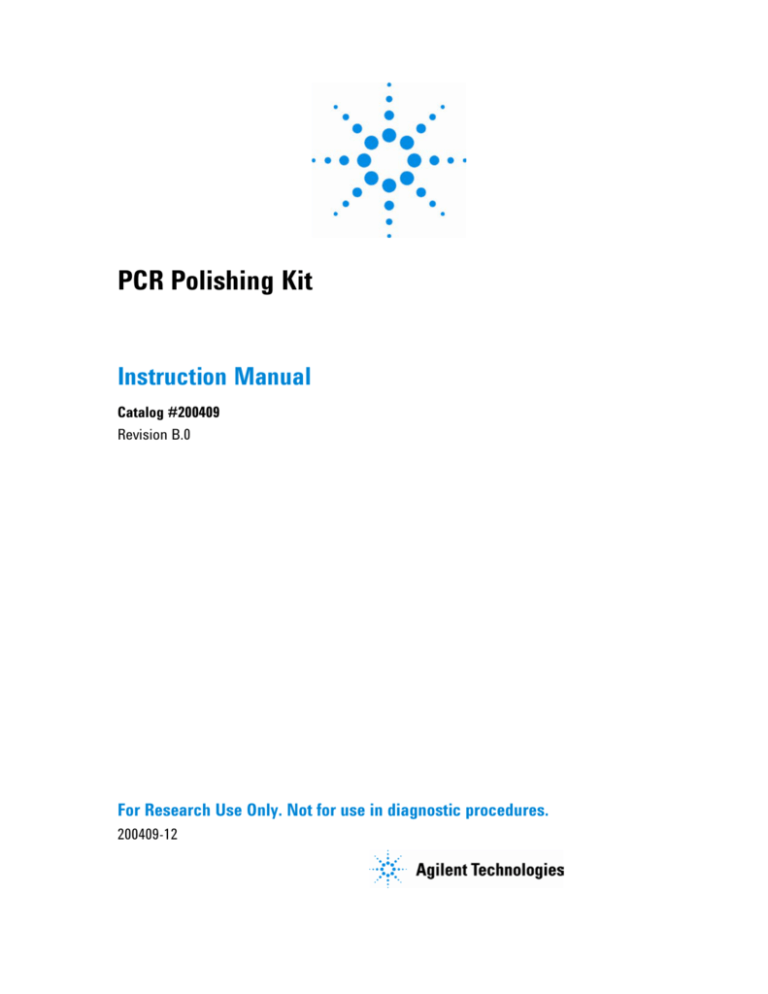
PCR Polishing Kit Instruction Manual Catalog #200409 Revision B.0 For Research Use Only. Not for use in diagnostic procedures. 200409-12 LIMITED PRODUCT WARRANTY This warranty limits our liability to replacement of this product. No other warranties of any kind, express or implied, including without limitation, implied warranties of merchantability or fitness for a particular purpose, are provided by Agilent. Agilent shall have no liability for any direct, indirect, consequential, or incidental damages arising out of the use, the results of use, or the inability to use this product. ORDERING INFORMATION AND TECHNICAL SERVICES Email techservices@agilent.com World Wide Web www.genomics.agilent.com Telephone Location Telephone United States and Canada 800 227 9770 Austria 01 25125 6800 Benelux 02 404 92 22 Denmark 45 70 13 00 30 Finland 010 802 220 France 0810 446 446 Germany 0800 603 1000 Italy 800 012575 Netherlands 020 547 2600 Spain 901 11 68 90 Sweden 08 506 4 8960 Switzerland 0848 8035 60 UK/Ireland 0845 712 5292 All Other Countries Please visit www.agilent.com/genomics/contactus PCR Polishing Kit CONTENTS Materials Provided .............................................................................................................................. 1 Storage Conditions .............................................................................................................................. 1 Additional Materials Required .......................................................................................................... 1 Notice to Purchaser ............................................................................................................................. 1 Introduction ......................................................................................................................................... 2 Precautionary Notes ............................................................................................................................ 2 Protocol ................................................................................................................................................ 3 PCR Polishing Reaction ........................................................................................................ 3 Standard Blunt-End Ligation of Control DNA...................................................................... 5 Preparation of Media and Reagents .................................................................................................. 6 References ............................................................................................................................................ 6 Endnotes............................................................................................................................................... 6 MSDS Information .............................................................................................................................. 6 PCR Polishing Kit MATERIALS PROVIDED Materials provideda Quantity Cloned Pfu DNA polymerase 100 U (2.5 U/µl) 10x cloned Pfu DNA polymerase bufferd,e 1.0 ml Control DNA (pUC19)f 50 µl (10 ng/µl) 10 mM dNTP mix 50 µl (2.5 mM each) b,c, a b c d e f c,d The PCR Polishing Kit contains enough reagents to perform 40 reactions. Agilent Catalog #600153 (100 U), #600154 (500 U), #600159 (1000 U), and #600160 (5000 U). Do not store the cloned Pfu DNA polymerase or the 10 mM dNTP mix in a frost-free freezer. We recommend aliquoting the 10x cloned Pfu DNA polymerase buffer and 10 mM dNTP mix into smaller volumes following initial thawing. Avoid multiple freeze–thaw cycles to achieve maximum levels of incorporation. See Preparation of Media and Reagents. The control DNA is linearized with 3´-end extensions (pUC19, Hind II-digested and Taq DNA polymerase treated). STORAGE CONDITIONS Cloned Pfu DNA Polymerase: –20°C 10× Cloned Pfu DNA Polymerase Buffer: –20°C Control DNA: –20°C 10 mM dNTP mix: –20°C (for up to 3 months); –80°C (for long-term storage) ADDITIONAL MATERIALS REQUIRED Sterile microcentrifuge tubes (0.5 ml) Mineral oil Sterile distilled water (dH2O) NOTICE TO PURCHASER LIMITED LICENSE Use of this product is covered by one or more of the following US patents and corresponding patent claims outside the US: 6,258,569, 6,171,785, 6,127,155, 6,030,787, 5,994,056, 5,876,930, 5,804,375, 5,789,224, 5,773,258 (claims 1 and 6 only), 5,723,591, 5,677,152 (claims 1 to 23 only), 5,618,711, 5,538,848, and claims outside the US corresponding to expired US Patent No. 5,079,352. The purchase of this product includes a limited, non-transferable immunity from suit under the foregoing patent claims for using only this amount of product for the purchaser’s own internal research. No right under any other patent claim and no right to perform commercial services of any kind, including without limitation reporting the results of purchaser’s activities for a fee or other commercial consideration, is conveyed expressly, by implication, or by estoppel. This product is for research use only. Diagnostic uses under Roche patents require a separate license from Roche. Further information on purchasing licenses may be obtained by contacting the Director of Licensing, Applied Biosystems, 850 Lincoln Centre Drive, Foster City, California 94404, USA. Revision B.0 PCR Polishing Kit © Agilent Technologies, Inc. 2015. 1 INTRODUCTION The PCR Polishing Kit is designed to increase the blunt-ended cloning efficiencies associated with polymerase chain reaction (PCR)-generated fragments.1,2 Recent studies have shown that many species of DNA polymerases (e.g., T7, modified T7, Taq, VentR® and Klenow fragment) exhibit terminal deoxynucleotidyltransferase-like activity (extendase).3,4 It has been found that the 3´-end nucleotide extension of PCR products by DNA polymerases is both nucleotide and polymerase specific. Each DNA polymerase, including the Klenow fragment, has characteristic terminal extendase activity with no consistent pattern of 3´-end modification. Therefore, it cannot be assumed that all DNA polymerases create bluntended fragments. Fortunately, Pfu DNA polymerase*, does not exhibit any DNA extendase and can be used to create blunt-ended fragments following PCR.5–7 Due to the unique 3´ → 5´ exonuclease (proofreading) activity of the Pfu DNA polymerase, Taq DNA polymerase-generated PCR products can be polished with Pfu DNA polymerase following temperature cycling to create blunt-ended DNA fragments for use in cloning, mutagenesis and cDNA construction. The PCR Polishing Kit is designed to polish the ends of the 3´-overhang extensions of polymerase-generated DNA fragments directly from a PCR amplification reaction. The PCR Polishing Kit can also be used to perform complete fill-in of 5´ overhangs to generate blunt ends. Dramatic increase in the population of blunt-ended DNA fragments following polishing treatment results in a drastic increase in overall experimental efficiency associated with procedures utilizing blunt-ended ligation. PRECAUTIONARY NOTES ♦ Before PCR polishing, it may be advantageous to verify the PCR products by agarose gel analysis in order to estimate the approximate concentration of PCR products and to ensure that the correct PCR products have been created following thermal amplification. PCR polishing is conducted using an aliquot of the PCR amplification reaction and will therefore polish the ends of all DNA fragments present. In a typical 100-µl PCR amplification reaction that has been cycled ~30 rounds exhibiting a strong band following agarose gel analysis, 5 µl of product can be used for PCR polishing. ♦ Before performing a 5´-fill-in reaction, the sample DNA should be extracted with phenol–chloroform and ethanol precipitated (see Optional Purification Protocols). * U.S. Patent Nos. 6,489,150 and 5,948,663. 2 PCR Polishing Kit PROTOCOL PCR Polishing Reaction For polishing PCR-generated DNA fragments, transfer an aliquot of PCR product directly from the reaction tube into a sterile 0.5-ml microcentrifuge tube. For 5´-fill-in reactions, aliquot purified DNA (10–500 ng) into a sterile 0.5-ml microcentrifuge tube. 1. Add the following components in order to the sterile 0.5-ml microcentrifuge tubes: Control Reaction 5.0 µl (50 ng) of control DNA 1.0 µl of 10× cloned Pfu DNA polymerase buffer 1.0 µl of dNTP mix 1.0 µl of cloned Pfu DNA polymerase (2.5 U/µl) dH2O to a total of 10 µl Sample Reaction 5.0 µl (10–500 ng) of PCR DNA 1.0 µl of 10× cloned Pfu DNA polymerase buffer 1.0 µl of dNTP mix 1.0 µl of cloned Pfu DNA polymerase (2.5 U/µl) dH2O to a total of 10 µl Gently mix the components of both microcentrifuge tubes and add a mineral oil overlay. 2. Incubate the control and sample reactions at 72°C for 30 minutes. After the 30-minute incubation, remove the reactions to ice. 3. End-polished DNA fragments may be added directly to ligation reactions. Note PCR Polishing Kit Pfu DNA polymerase has very little activity when used in ligation reactions (25°C). Therefore, PCR-polished DNA fragments need not be further purified for use in ligation reactions. However, an optional purification protocol has been outlined in the following section (see Optional Purification Protocols). 3 Optional Purification Protocols The PCR-polished DNA fragments may be further purified to remove the Pfu DNA polymerase and excess dNTPs or for buffer exchange. The StrataPrep PCR purification kit [Agilent Catalog #400771 (50 preps) and #400773 (250 preps)] can be used in the place of phenol–chloroform extraction procedures. Conventional phenol–chloroform extraction is outlined below: 1. Aliquot the PCR-polished reaction mixture, avoiding the mineral oil overlay, to a sterile 0.5-ml microcentrifuge tube. Adjust the final volume to 100 µl with TE buffer.§ 2. Add an equal volume of phenol, vortex and remove the top aqueous phase to a sterile 0.5-ml microcentrifuge tube. 3. Add an equal volume of chloroform, vortex and remove the top aqueous phase to a sterile 0.5-ml microcentrifuge tube. 4. Precipitate the DNA using ammonium acetate as follows: § 4 a. Add 1/10 volume of 10× STE buffer.§ b. Add an equal volume of 4 M ammonium acetate to the sample. c. Add 2.5 volumes of room temperature 100% (v/v) ethanol. d. Immediately spin in a microcentrifuge at room temperature for 20 minutes at 10,000 × g to pellet the DNA. e. Carefully remove and discard the supernatant. f. Wash the DNA pellet with 200 µl of 70% (v/v) ethanol. g. Spin in a microcentrifuge at room temperature for 10 minutes at 10,000 × g. Carefully remove the ethanol with a pipet. h. Dry the DNA pellet under vacuum. i. Dilute the DNA into TE buffer or into a preferred diluent prior to ligation. See Preparation of Media and Reagents. PCR Polishing Kit Standard Blunt-End Ligation of Control DNA The unpolished control DNA (pUC19) contains 3´-end nucleotide extensions and will ligate at an extremely reduced efficiency in the presence of T4 DNA ligase. PCR polishing removes 3´-end nucleotide extensions created by DNA polymerases and will produce blunt-ended DNA molecules which will religate at high efficiency in the presence of T4 DNA ligase. For the efficient cloning of blunt-ended PCR products, we recommend using the PCR-Script Amp cloning kit (Agilent Catalog 211190).8,9 In the presence of rATP and T4 DNA ligase, ligations of control DNA can be performed as follows: Unpolished Control DNA 1.0 µl (10 ng) of unpolished control DNA (pUC19) 1.0 µl of 10× cloned Pfu DNA polymerase buffer 0.5 µl of rATP (10 mM stock) 1.0 µl of T4 DNA ligase (4 Weiss U) 6.5 µl of dH2O PCR Polishing Kit PCR-Polished Control DNA 2.0 µl (10 ng) of PCR-polished control DNA (pUC19) 1.0 µl of 10× cloned Pfu DNA polymerase buffer 0.5 µl of rATP (10 mM stock) 1.0 µl of T4 DNA ligase (4 Weiss U) 5.5 µl of dH2O 1. Incubate the ligations at room temperature (22°C) for 1 hour. 2. Transform 1–2 µl of the ligated DNA into competent E. coli cells. The control DNA (pUC19) provided is an ampicillin-resistance encoding plasmid and should be spread onto LB–ampicillin agar plates (see Preparation of Media and Reagents) following transformation. 3. Following the overnight incubation at 37°C, the transformation plates containing PCR-polished control DNA should exhibit a >20-fold increase in colony forming units (cfu) when compared to unpolished control DNA transformants. 5 PREPARATION OF MEDIA AND REAGENTS 10× Cloned Pfu DNA Polymerase Buffer 200 mM Tris-HCl (pH 8.75) 100 mM KCl 100 mM (NH4)2SO4 20 mM MgSO4 1 mg/ml of bovine serum albumin (BSA) 1% Triton® X-100 LB Agar (per Liter) 10× STE Buffer 1 M NaCl 200 mM Tris-HCl (pH 7.5) 100 mM EDTA TE Buffer 10 mM Tris-HCl (pH 7.5) 1 mM EDTA LB–Ampicillin Agar (per Liter) 10 g of NaCl 10 g of tryptone 5 g of yeast extract 20 g of agar Add deionized H2O to a final volume of 1 liter Adjust pH to 7.0 with 5 N NaOH Autoclave Pour into petri dishes (~25 ml/100-mm plate) 1 liter of LB agar, autoclaved Cool to 55°C Add 10 ml of 10-mg/ml filter-sterilized ampicillin Pour into petri dishes (~25 ml/100-mm plate) REFERENCES 1. 2. 3. 4. 5. 6. 7. 8. Costa, G. L. and Weiner, M. P. (1994) Strategies 7(1):8. Costa, G. L. and Weiner, M. P. (1994) Strategies 7(2):47-48. Clark, J. M. (1988) Nucleic Acids Res 16(20):9677-86. Hu, G. (1993) DNA Cell Biol 12(8):763-70. Costa, G. L. and Weiner, M. P. (1994) PCR Methods Appl 3(5):S95-106. Costa, G. L., Grafsky, A. and Weiner, M. P. (1994) PCR Methods Appl 3(6):338-45. Costa, G. L. and Weiner, M. P. (1994) Nucleic Acids Res 22(12):2423. Bauer, J. C., Deely, D., Braman, J., Viola, J. and Weiner, M. P. (1992) Strategies 5(3):62-64. 9. Costa, G. L., Sanchez, T. and Weiner, M. P. (1994) Strategies 7(2):52. ENDNOTES VentR® is a registered trademark of New England Biolabs, Inc. Triton® is a registered trademark of Rohm and Haas Co. MSDS INFORMATION Material Safety Data Sheets (MSDSs) are provided online at http://www.genomics.agilent.com. MSDS documents are not included with product shipments. 6 PCR Polishing Kit
